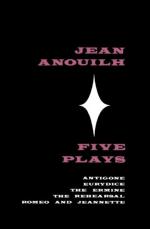|
This section contains 4,446 words (approx. 15 pages at 300 words per page) |

|
SOURCE: Spingler, Michael. “Anouilh's Little Antigone: Tragedy, Theatricalism, and the Romantic Self.” Comparative Drama 8, no. 3 (fall 1974): 228-38.
In the following essay, Spingler asserts that Anouilh's use of the chorus in Antigone functions to “establish the play's essential theatricality” and reinforce his perception of romantic theatrical techniques.
The loss of a tragic sense in the theatre is a major concern of many modern dramatists and critics. In his Antigone, Jean Anouilh suggests that the reasons for this decline may be located within one of the fundamental developments of modern tragedy, that is, the replacement of action by character as the dramatic mainspring.1 He sees the predominance of character as a fundamentally romantic development which leads to the emergence of a protagonist whose self-consciousness diminishes the tragic event. Anouilh's disenchantment with romantic posturing is expressed primarily in terms of a theatricalism which implies that tragedy based solely on character is...
|
This section contains 4,446 words (approx. 15 pages at 300 words per page) |

|


